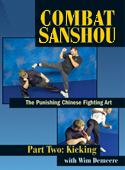|
In This Hub:
Best MA for SD? Bullies Commercialized MA Cults in the MA Evaluating a MA Fighting Facts Fighting vs. Self Defense Four Focuses of MA Training Grappling Know Your Tools Krav Maga Lethal Force and MA Training MA and SD MA Biz MA Lies MA Pirates MA Short Cuts, et all MA Subculture McDojo Mental Preparation Mixed Martial Arts Real Fighting Sanity in MA/SD Self-Defense Sports Martial Arts Stance Strike Enhancers Technique, Don't Dismiss It Threat Displays Traditional MA/Self-Defense Tough Enough? Walking the Talk What Do You Want From MA? What If Monkeys Why We Do It MA Training Hub Self Defense Hub Streetfighting Hub NNSD Home Page
Marc MacYoung? |
You need to attack simpler, he's a beginner!" "That's not realistic." "He can't handle realism yet, he's just a beginner. You can because you're a master" What a "pirate" told Dr. Kevin Menard about not attacking like Robo-man at a seminar thereby causing the technique the pirate was teaching to fail Martial Arts Pirates On this page: The term "Pirates" -- describing an unfortunate phenomenon in commercial martial arts schools -- was a term we first heard from a man named Ventura Silva. In just a few sentences he very eloquently described a major trend in the Western martial arts world. And although he probably doesn't realize it, it is also a major tactic of martial arts cults. Begin with the fact that in the Western world, most martial art schools/groups/organizations are businesses. In order to survive they must make money. Even the most committed sensei must pay the rent and electricity for the school and that is what student fees go for. However, if you have a commercial school (as we define the term, someone who is making their living off teaching martial arts) then what you are dealing with is definitely NOT a philanthropic organization. Now the instructor must make not only the school expenses, but his own house payments. To stay in business in this manner you must constantly sell new products and services. That simple fact has a major effect on what is being taught in most westernized martial arts schools. Of equal importance is the fact that in oriental cultures the relationship between a student and a teacher is radically different than it is here in the West. Although this relationship can span decades, very seldom is it fundamentally economic in nature. That has a serious effect on what is taught and how it is taught in those circumstance. Recognizing the natures of these different ways of teaching is critical to understanding the problems that are discussed on this page. The Problem (short form)
Much less, how it really works. What else is involved and how it can all blow up in your face without these other aspects. Therefore they are charging you full price for half information. This motivations for this behavior are many, and they are quite simply beyond the scope of this page. However, the results are pretty identifiable. What is being taught is flawed. Parts are missing. These parts are critical for the "move" to work in real life (1). With parts missing the technique doesn't work beyond the confines of the dojo/training hall/academy walls. When we say something doesn't work outside the dojo, what we mean is that often people in MA schools are taught to attack in stilted unrealistic ways that allow for pirated and/or incomplete techniques to still work (2) . We will discuss somewhere else the difference between isolating an element in order to teach it and teaching an unrealistic, unworkable technique as a complete move. Pirates specialize in the latter as they never take the parts and successfully bring them together. How can they? They don't have the whole process. Instead they present a fragmented, disjointed and shallow version.. You cannot expect these flawed interpretations to work in a live-fire situation. More specifically, even in the school, a pirated move generally doesn't really work for anyone other the lead pirate (head instructor). Usually this is because the instructor has something that allows him to "patch" the move enough to make it *sort* of work for him. By this we mean he can make it work as long as he is very specific on whom he does it on. (Don't think that a savvy pirate isn't very selective on who he demonstrates on and how he will be attacked) Those few senior students who can make it work also have some kind of compensating "patch" such as muscle, size or speed that allow them to "fake" the move. To those who know what the move is supposed to look like, these pirated versions are obviously flawed. The flow and nature of the movement is wrong. To them, it is like seeing an alphabet presented as ABD2HI56XYZ. There are not only 18 letters missing, but there are things there that do not belong. And yet the pirate is trying to present this as though it were the complete 26 letter alphabet. But to the uninformed and/or new student however, this move looks great. It really does look like a grand demonstration of martial prowess. And gosh, golly gee, and to learn it all they have to do is sign a year long contract. Coming back to the alphabet analogy, as far as the student knows, it is the complete alphabet. How is an "illiterate" student to know that an alphabet has 26 letters and nothing but letters? This is not at all pleasant. for the student. In fact, it can be downright dangerous if the student ever does find him/herself in a violent encounter. That's because when it comes to self-defense what you need is something that works, not something that looks good. Now that is on the physical front. Where most pirating goes on however, is on the much more vague idea of self-defense, personal safety and tactical responses. Pirates get a hold of an idea and then proceed to teach with without any further training or research. This is a double threat to the student. If something were ever to happen and what the instructor is teaching doesn't get the student killed then the odds are it will put the student in serious legal jeopardy. This is where you get such asinine concepts as a neck break from behind or slicing someone's arm with a knife for trying to punch you being presented as self-defense. However, the simple fact that the pirated version is presented is often mistaken by students to constitute the whole of the subject. Unfortunately a more common day to day problem exists as often pirated training encourages a wide variety of dysfunctional behavior. One of which is an ugly combination of unfounded arrogance, aggression and even cult-behavior. As I mention in the section below, one must seriously question the motives of someone who is willingly buying from pirates. Return to top of page Explaining pirates and how they operate From: Marc MacYoung This post was largely an off the cuff explanation to someone who was trying to figure out on one hand, the degree of responsibility a student has and on the other the ethics and standards that instructors must have. If either element is lacking there is the potential for problems. However, this response was to show that such questions don't exist in a vacuum, there are many other factors involved that shade both sides of the issue. Before attempting to answer such a large, vague question one should at least be familiar with the factors that not only affect the question, but will frame the answer, such as the differences between Eastern and Western teaching practices and how each can be abused. Return to top of page Spotting pirates The pirate vessel quickly changed course and disappeared over the horizon. It's rather interesting to note that MA pirates act in many ways like real pirates. They spend a lot of time cruising the "sea lanes" seeking booty. But they are very selective about who and what they pirate. And like real pirates when their actions are contested they tend to backpedal quickly. Or at least feign great innocence until they can withdraw to ply their trade elsewhere. As an instructor, you can easily see the pirates skulking around the edges of a seminar picking information to go back and start teaching it. There's just something about them, hungry and conniving air about how they take in the information that tells you they aren't learning, but instead are pillaging. While this might seem mystical sounding there are certain non-verbal cues that people give off when they are learning something. How people unconsciously act when processing new information is recognizable to experienced teachers. As is when someone is just going through the motions while their minds are elsewhere. Pirates have a certain look to them as even when hearing the information for the first time they are planning how they are going to present this information as their own. It is exactly that look that Mr. Silva recognized when he made the original comment As a student there are certain tell-tale signs when you are dealing with a pirate as opposed to someone who really knows what they are talking about. Perhaps the best way to describe the difference is in the allegorical comparison of chrome to quality steel. Although this might sound a little lyrical. The analogy stands up very well. Namely because quality steel is quality steel, the value of it comes from what is contained within. It is a value that runs through out the entire object. Whereas chrome has a shallowness to it, despite it's bright shiny appearance. In fact, the difference between chrome and good steel is one is a mirror. Chrome reflects back your image, and that is most often the appeal. It's bright, shiny and you can see yourself in it. Unfortunately, in reflecting what is around it, chrome masks the flaws of what is underneath it. Having said that, let's take a gander at some of the danger signs to look for:
Multiple "Master" ranking Lots of certification A PhD from an unaccredited university is just a piece of paper with letters on it. A PhD from an organization is a joke. The reason one needs to be concerned about excessive certification is that accredited certification takes time! As well as lots of money. When you are standing there looking at a wall of certifications, figure a minimum of six months and $5000 for each certification. About this time you should begin to wonder where this person found all this time and money to get accredited certification in all these areas. This is especially true when you think about all the time it takes to run a business too. Truth is when you start reading the sources of all these certifications, you begin to notice they are from strange sounding organizations, often in far off distant places. Or our personal favorite, diplomas from places like Comon I Wannalaya" University in Hawaii. These mythical universities all unfortunately seem to have disbanded sometime in the past. Think about that for a second. Have you ever heard of an accredited university closing? UCLA? Cornell? Regis? Harvard? CU Boulder? Have any of them gone out of business lately? Even privately owned universities like USC, Loyola Marymount, Notre Dame, Westwood and DeVry have a tendency to stay in business. A defunct "university" is really questionable. As are degrees from them. What is also questionable are certifications from organizations with names like "The World Budokan Federation" based out of Illinois. Basically, take a quick trip to these groups 'Websites and see if they are selling certification. It's amazing how many organizations will give you ranking, certification and yes, even diplomas for the right amount of money. Sure they'll sell you instructional tapes and books, but the prize in the crackerjack box is that piece of vellum that says "You are now certified/dan ranked/qualified to teach." Pirates, knowing how impressed naive people are with certifications, love the kind of organizations that hand vellum out like candy. This is to a MA pirate what a letter of marque was to a privateer. It is literally a license to raid and pillage. From there on any scrap of related information that comes near them will be swept into the plunderer's bag and presented as though it had always been part of their original training. Never mind the fact that what they are claiming was taught to them years ago all came from a video course curriculum or a few seminars that they attended. That is something else to watch for, read the "certifications" carefully...many of them come from weekend seminars instead of ongoing training that spans years. Return to top of page Missing "Crouching Tiger/Hidden Dragon" masters The reason pirates use missing masters is that they are convenient means to "laundry" pirated information. Any pirated information can be attributed to the sage and missing master. Which if you think about it, saves the pirate the problems of fake certification, research and all kinds of embarrassment if the information he is presenting is found elsewhere. That way the pirate can proceed to explain how wise and sage his master was to know all this information. On a very closely related topic have you ever wondered about the other
purpose of the international dateline? Apparently it doubles as an international
black belt line. That is the line that service men, whose tour of duty only
lasts a year overseas, suddenly gain a black belt on their return trip. While
many do honestly study martial arts while they are there, one must wonder
how much they really learned in their limited tour of duty. And yet, it is from
their short time there that they attribute their deep understanding of the
martial arts. And yet, somewhere way over the ocean is a grand master who
bestowed this exalted rank upon this person in such a short time. A grandmaster
who you can't call up and ask about the pirate's true qualification See my lineage? You can't question my lineage The grand poo bah's name and reputation serves as a shield against questioning the pirate. Because, after all if you question the pirate, by extension you question the grand high mucky mucky maha-ha kahuna. Well as someone who has more than my fair share of live fire experience with not only violence, but the aftermath, I only have one question. "So how does having intense knowledge in one aspect of the subject (the martial arts) qualify someone in criminology, psychology, street fighting, violence statistics and most important of all, legal issues arising from violence? For example, last time I checked Danny Inasanto is not a defense lawyer or a prosecuting attorney. Therefore, one must ask how does what he teaches address the legal problems and restrictions of its use? The answer is it doesn't. And quite frankly nor should it. What he teaches is what he teaches. (For the record, I have the highest respect for Mr. Inasanto and his understanding of the martial arts) Having said that, on numerous occasions I have encountered pirates who present pillaged information under his name. Information, that by invoking his name, you were not allowed to question. Wrong... If someone is asking you to risk your life based on the validity of this information, you damn well have every right to question. And that goes triple if they are presenting it as either self-defense or a "fighting system." How the hell do you know this "ultimate fighting system" really works? It's battle tested? By who? I want to talk to that person and find out how and why it worked. And more importantly, how often have they used it? Does it work on a regular basis or was it just a one time shot? Pirates want you to engage in "one stop shopping." They don't want you to go looking elsewhere for "real" information, they want you to keep on buying their knock-off version. This is why you must always consider carefully the width and scope that they claim to be able to sell you. You must ask yourself "how can they know all of this?" Pay special attention to this questionable "wide breadth of information" if they aren't referring you experts in these areas that they claim to know. Return to top of page Lots of information, no resources, cites or sources If someone is well read, where are the books? Why isn't there at least at least a book case in the office to have on hand for reference? How can someone be well informed on a wide variety of subjects and not be able to easily list a large bibliography? Or at least able to list sources for ideas and explanations? In that vein, why isn't there an extensive list of favorite resources in the pirate's Web browser? Neither information or sources is vague. Volumes of it should be able to be pulled up and confirmed at the drop of a hat. If someone is widely read on a subject why do they constantly use only one or two main references? Is it possible that other references are not mentioned because information has been pirated and a student upon reading these references would realize that what is being presented is flawed? In the same vein, someone is well versed in a subject then that person should not only be able to discuss an issue in depth, but be able to do so with an expert in the field. To the average person, these kinds of discussions can seem like sitting under the flight path of an airport, things just go flying overhead. But there is a level of comfort among those conversing. They know what they are talking about. With this in mind, there is an interesting behavioral point about pirates, they will often extensively discuss a topic when experts aren't around, but will smoothly avoid it (or very carefully speak) when an expert is present. They do this to avoid their flawed interpretation being revealed. Return to top of page More tradition than Fiddler on the Roof Never mind that tradition was freshly minted last week. Unfortunately, that is only a slight exaggeration. Over a five year period I personally watched a form undergo several radical changes. My wife who had been affiliated with the school for fifteen years had seen even more changes. And yet, despite countless radical revisions and tweaks to the form it was called a "traditional" Tae Kwon Do form. (which is in and of itself rather amusing since Tae Kwon Do was created in the 1950s by the forced unification of several kwans by General Choy) Pirates tell tall tales There is a marked difference, however, between the stories meant to teach/inform and the sea-stories told by pirates. The difference is that with teaching stories you learn something. Pirate's tales serve only one purpose, glorification, of both the pirate and the system. And that is how you tell the difference between a teaching story and a lurid tale of adventure designed to impress you so you buy pirated goods. A story designed to teach you an important concept has a purpose other than telling you how great/deadly/effective this system is or what a ultimate badass the instructor is for using what he is now imparting to you for this small paltry fee. Listen for the "Glory Factor" in these tales. People who have actually been there unconsciously include certain elements that pirates avoid. That's because these elements make them look bad. Things like mistakes. Try going through a day without making a mistake. Don't drop a pen. Don't push the wrong button on the computer. Don't put something in the wrong place. It's nearly impossible. As humans we make countless goofs, mistakes, get confused and miscalculate every day. And that's when people are operating under normal conditions. In battle/conflict you not only have the natural tendency to make mistakes, but someone is actively to not only jam those attempts, but to do unto you before you do unto him. In those charged conditions MISTAKES HAPPEN! In football terms, fumbles happen, plays are blocked and passes are not completed. There is no "veteran" whether from the military, police, bouncing, security or streetfighting that doesn't have stories about how they "stepped on their dicks" in action. Oddly enough, pirates never tell these kinds of stories. Nor do they tell stories where their invincible fighting system was "vinced." The reason is that pirates stories are not designed to teach, they are designed to sell. They are designed to convince the buyer that what they are buying is indeed worth the price the pirate is asking. Upon hearing this many people respond but "Why do it if I have already bought?" One of the answers is advertising. A student who is awed about glorious tales of how effective this system is will go out and tell others. Think of how many stories you have read on the internet about how street effective some system is and how it has been battle tested and FDA approved. Then ask yourself, how many of those stories are being told by the instructor himself on the internet; vs. how many times it is the students who are promoting the stories as proof that they have bought a quality product? That's free advertising for the pirate. But one must ask, where did these stories that the students are passing on
come from? The student didn't make them up. How not to be taken by pirates The problem with this answer is that upon hearing it most people think of school papers and homework. Au contraire! Research into a hobby that you love is exciting and fun. Pirates however, rely on people's misconception of research and, to a large degree, their laziness about doing it. The more widely read, experienced and informed you are about subjects that the pirate is trying to present as his own, the more apparent it will be that you are dealing with a Jolly Roger.. Read books, surf the web, watch videos; the more you know the more easily recognizable pirates are. (BTW, ebay, half.com and Amazon used books are a wonderful way to collect an extensive library and video collection at rock bottom prices) Subscribe to magazines that are a cut above the MA rags that you find in the supermarket. Look beyond the martial arts or reality based self-defense perspective on these topics. How much more does a cop or criminologist know about how crime and violence "really" happens than a martial arts instructor? How much more does an anthropologist, sociologist, language or history teacher know about different cultures and how things work there? The wider your knowledge about a subject the more obvious the pirate's cheap version will be. This research also extends beyond books and videos and into attending seminars. While there are big name martial artists who are constantly touring, what about attending seminars by people who are not as well known, but are often far superior martial artists? There are practitioners in the arts who come to their student's schools or affiliate/organization schools who are indeed masters. Their abilities in their fields are awe inspiring. Don't learn a style's concepts from someone who is cross trained. If you are into cross training, go to the source. Attend seminars in arts that are presented by people that is ALL they do. You will be stunned to see the difference in skill between a pirate and someone who -- despite being less well known -- really has mastered one art. The more you know, the more you have researched, the more you have experienced the more easily you will recognize the shallow, pillaged, gilt coated knowledge that the pirate is attempting to present as real gold. Return to top of page In the end, the responsibility is
yours That's to say that you will be the one appearing foolish if you repeat the pirate's tales and techniques to those who are knowledgeable about the subject.. There are not only a lot of people out there who do know what they are talking about on a certain subject, but there are a lot more who know where the pirates have plundered from. When you attempt to "strut your stuff" for these people you will end up looking foolish. For example when you demonstrate Brazilian Jujitsu techniques (that the pirate learned from a video tape) and tell a BJJ player that they are from an ancient Korean style of Yudo, the BJJ player is going to laugh in your face. And be right in doing so. Unfortunately, if you try to step on the mat using your pirated techniques against someone who is from the system that it was plundered from, odds are you are going to get spanked. We have a saying about many of the martial artists that we encounter "He's very well trained in a bad system." Usually these "bad" systems are flawed; and flawed not because of what they do, but rather what they don't do and/or what is missing from them. Going up against someone whose training has those missing parts is a humbling and embarrassing experience. In the final analysis the best way to protect yourself against pirates is to be an educated consumer. That means do your own research. And do it from outside sources, sources that are specific to that topic. As an example, don't just go to the dojo or martial art/SD forums for legal advice about what is and isn't self-defense, look it up yourself, consult with attorneys and even take a class. Another example is do not learn grappling from a mixed martial art school, go to the source. Same thing with any particular style. Want to learn Wing Chun go to a Wing Chun school. Want to learn silat? Go to a school that only teaches silat. Don't learn muay Thai from a school that teaches six other styles. Go to a muay Thai academy. I am a big fan of cross training. However, in a very specific way. Go to the source. Sure you can be introduced to a system in a mixed martial art school, but take the training in that system AT a school that specializes in that art. Otherwise you get the "flavored" versions that I spoke of earlier. Start a martial arts library. Start a large video and DVD collection of instructional videos. Attend seminars and workshops. Watch what other teachers present, talk about and most importantly do. Watch closely how they move. Listen to how they explain things. By doing this you often discover wonderful and exciting explanations for problems that you struggling with. Often all it takes is someone phrasing the information in just a certain way that will cause light bulbs of understanding to go off in your head. And as you gain all these benefits, just remember to cite your sources.
#1 See "Becoming a Complete Martial Artist: Error Detection in the Martial Arts" by Tristan Sutrisno, Marc MacYoung and Dianna Gordon MacYoung. Return to text . #2 If you have high speed internet or DSL see if you can find Jim Carey's Karate sketch from the old show "In Living Color." This sketch is home to the infamous quote "Like all beginners you attacked me wrong!" (as he is standing there bleeding from a knife wound) It is a hysterically funny sketch about an incompetent, lying bully instructor teaching "self-defense." It is also, unfortunately, horribly accurate about what is taught in many strip mall dojos. It shows the kinds of unrealistic and flawed attacks that you must do in order for pirated techniques to work. Return to text. #3Generally the title of "master" is bequeathed after 5th or 6th dan. Back in the days before "rank inflation" and the cross training craze, neither the rank nor the title was given before someone was nearing sixty. And only then after a lifetime's dedication to one "art." Using this "traditional" standard, someone claiming to be a master in three different arts would have to be around 150 years old. Pirates must be very well preserved for their age. Some internet instructors, who claim to be masters of eight or more styles, must be Methuselah in hiding. Return to text. |
 Meditations on Violence
Meditations on ViolenceLearn More > Order Now!
|
||||||
|
||||||||









































